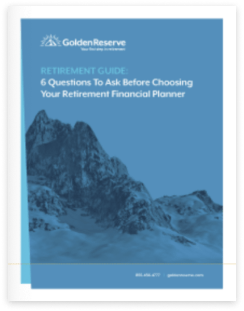Retirement Guilt: We Hesitate to Spend, Yet Overlook Advisor Fees
All our working lives, we dream of what we’ll do with the money we’ve saved and the…
Golden Reserve

Find Out What Makes Us Different from a Financial Advisor
For most people, the financial services industry can be downright intimidating. With all the jargon and complexities, it’s no wonder some folks don’t feel comfortable asking even the most basic questions. That’s why today, we’re going to tackle one of those questions: what is a retirement planner?
First and foremost, a retirement planner is not a financial advisor. There are some key differences. Let’s start with who they serve. Retirement planners work only with clients in or near retirement, while financial advisors work with clients from every walk of life, from 20-somethings entering their first job to the elderly. Why is that an important distinction? Because if you serve everyone, it naturally narrows the specialties you’re able to provide under one roof. What the elderly client needs in terms of services and strategy is much different than what a young professional needs. So financial advisors work to meet the lowest common denominator: investments.
That brings us to our next key difference. Financial advisors are focused on investment selection and allocation, while retirement planners are focused on protection and preservation. Let’s break that down. When retirement is still a decade or more away, there is room for your investments to grow, and that’s precisely what you want your financial advisor to help you do. But as you near retirement, it’s time to start thinking about how you’ll protect what you’ve grown. The exposure to market risk that helped you build your nest egg now could pose a threat in the event of an economic downturn. So too could paying too much in investment and advisor fees or taxes. Plus, you’ll need to think about how you might pay for long-term care in the event that you need it down the line. It’s time to shift strategy.
Here’s what a retirement planner will focus on:
Long-Term Care
Long-term care is often one of the most overlooked threats to retirement. It also has the potential to have the biggest impact. Many financial advisors don’t have the resources or experience to help clients plan for the expense, which leaves many people simply hoping for the best. Retirement planners know there’s a better way and are experienced with all the various strategies available—from self-funding to insurance options and legal tools like asset protection trusts. At Golden Reserve, we even offer trusts to our clients who need one through our estate planning and elder care law partner at no additional cost.
Taxes
In retirement, you’ll be relying on your retirement accounts to provide sustainable cash flow. Unfortunately, if you’re not careful, taxes can take a big bite out of your distributions, eroding your IRA value. A retirement planner will create an IRA de-tax draw strategy that times your distributions and amounts to help you stay in the lowest tax bracket possible. They’ll also help you assess the best way to reduce or eliminate the dreaded widow and kiddo penalties so you can be sure the assets you leave to your loved ones have the desired impact.
Investment Fees
You’ve probably heard people talk about the importance of avoiding high-cost investments. This becomes especially critical in retirement. In your prime earning years, it might be easy to overlook investment costs when you’re still making contributions to your retirement accounts. Besides, you’re busy and those fees aren’t exactly easy to find. But once you hit retirement, you’re no longer making contributions to your accounts, which means those expensive investment and advisor fees will feel a lot more painful. Retirement planners are acutely aware of this and only offer investment products that are optimized for retirement, meaning they grow with the lowest possible fees and risk.
Market Risk
The effects of an economic downturn can be devastating for any portfolio, but especially for those in or near retirement who no longer have time on their side to recoup the losses. That’s why it’s so important to begin downshifting your risk as you near or enter retirement. A retirement planner will model the performance of your portfolio in the event of an economic downturn so you can safely assess whether the results align with your risk tolerance and goals. They’ll also help you recalibrate your portfolio into retirement-optimized investments as mentioned above.
There you have it—retirement planning in a nutshell. Now that you know what makes a retirement planner different from a financial advisor, find out how to choose the right planner for you. Download our free guide, “6 Questions to Ask Before Choosing Your Retirement Planner,” to make your search that much easier.
Watch Golden Reserve Partner Josh Maly break down the differences between a financial advisor and a retirement planner on the Expedition Retirement Show℠.

Share this article
All our working lives, we dream of what we’ll do with the money we’ve saved and the…
Recently, a publication targeted toward financial advisors published an article wondering if advisor fees based on assets…
“Set it and forget it,” is the financial industry’s refrain for retirement success; as in, invest in…
Maybe You Shouldn’t Hang Out with Eddie In this adaptation from Golden Reserve Founder Greg Aler’s new…